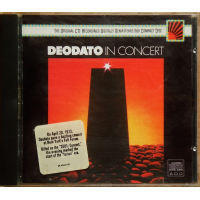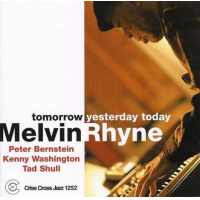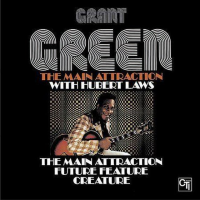Home » Jazz Articles » Liner Notes » Fela Anikulapo Kuti: Perambulator
Fela Anikulapo Kuti: Perambulator
The discographical trail is as follows: the title track was first released in 1978, as the flipside of Shuffering And Shmiling on the French label Barclay; the Lagos International LP, reissued here with the original (inaccurate) sleeve art, followed in 1983. The title track appeared once more on a pirated CD compilation in 1998. Apart from that, nothing.
Anyone familiar with Afrika 70 in its heyday will recognise the provenance of Perambulator from the evidence in the grooves. The sound is palpably classic mid-1970s Fela. For anyone doubting their ears, other indicators pinpoint a recording date in late January or early February 1977; some time in the weeks immediately before the 18 February destruction of Fela's self-declared autonomous republic, Kalakuta, by the Nigerian army, in an attack sanctioned at a high level in the military regime.
The clincher is the presence of US trumpeter Lester Bowie, of the Art Ensemble Of Chicago. Bowie stayed with Fela for a few weeks in early 1977, but returned to the US on or around 15 February. Bowie guested on several Afrika 70 sessions during his stay and the Lagos International sleeve, in one of its many anachronisms, includes him in the personnel listing. The trumpet solo on "Perambulator" is unmistakably Bowie, not Fela's regular trumpeter, the great Tunde Williams.
Further evidence, not that it is needed, of the album's early 1977 origins comes with the lyrics for "Perambulator." These are in the main a humorous lampoon of incompetent, lazy government bureaucrats, who "perambulate" aimlessly and ineffectually, and waste public money on jollies such as trips to London to study British methods of garbage collection. Following the carnage of Kalakuta's destruction, Fela's lyric writing became altogether fiercer. It is almost inconceivable that he would write a relatively light-hearted lyric such as "Perambulator" after 18 February 1977.
The Nigerian release of "Perambulator" was delayed until 1983 because it was caught up in the aftermath of the army's 1977 attack. Fela and several dozen other Kalakuta residents were homeless, broke and scattered around Lagos. Fela, who was in dispute with his record label, Decca, over unpaid royalties, decided to squat in Decca's offices with some of Afrika 70's dancers and back-up singers in protest. They stayed there for seven weeks between mid June and early August 1977. Decca, fearful of regime reprisals if it offered support to Fela, halted all releases of Afrika 70 records. Shortly afterwards, the police, ostensibly in pursuit of evidence in the unpaid-royalties case, and with the connivance of Decca, confiscated all Afrika 70 master-tapes held by the label and Fela had to fight in the courts for months for their return. Any planned 1977 release simply got overtaken by events.
The album's flipside, "Frustration," an instrumental, has its origins in the song "My Lady Frustration," which Fela wrote for his American girlfriend Sandra Izsadore and recorded with his band Nigeria 70 in Los Angeles in 1969. The earlier version is a gritty blend of highlife and rhythm & blues, with minimal vocals, and is a fine example of Nigeria 70's proto-Afrobeat.
The late 1976 or early 1977 version heard here drops the vocals but retains the song's signature horn-arrangement, and introduces one of Tony Allen's signature Afrobeat rhythm-patterns in place of the earlier highlife/R&B hybrid. There are extended solos from Fela on organ and Tunde Williams on trumpet and, probably, Christopher Uwaifor on tenor sax. Williams' solo includes some choice references to Miles Davis's "In a Silent Way," which he first heard in Los Angeles in 1969, the year it was released. ("Frustration" was originally planned for release in 1977 as the flipside of the album I Go Shout Plenty, for which it was actually given the catalogue number DWAPS 2036 by Decca. But the release was delayed for the same reason as Perambulator. "I Go Shout Plenty" b/w "Why Black Man Dey Suffer" was released as I Got Shout Plenty in 1986).
So that is the story of Perambulator. Now enjoy the music.
Liner Notes copyright © 2026 Chris May.
Perambulator can be purchased here.
Contact Chris May at All About Jazz.
Chris May is a senior editor of All About Jazz. He was previously the editor of the pioneering magazine Black Music & Jazz Review, and more recently editor of the style / culture / history magazine Jocks & Nerds.
Track Listing
Perambulator; Frustration.
Personnel
Fela Kuti
saxophoneAdditional Instrumentation
Fela Kuti: vocals, organ; Afrika 70.
Album information
Title: Perambulator | Year Released: 2020 | Record Label: Partisan / Knitting Factory
Tags
PREVIOUS / NEXT
Support All About Jazz
 All About Jazz has been a pillar of jazz since 1995, championing it as an art form and, more importantly, supporting the musicians who make it. Our enduring commitment has made "AAJ" one of the most culturally important websites of its kind, read by hundreds of thousands of fans, musicians and industry figures every month.
All About Jazz has been a pillar of jazz since 1995, championing it as an art form and, more importantly, supporting the musicians who make it. Our enduring commitment has made "AAJ" one of the most culturally important websites of its kind, read by hundreds of thousands of fans, musicians and industry figures every month.




















